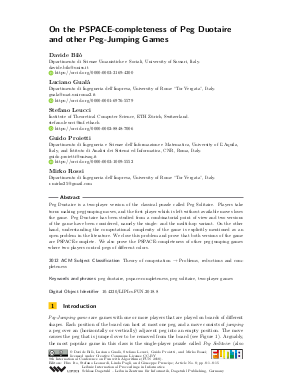On the PSPACE-completeness of Peg Duotaire and other Peg-Jumping Games
Authors
Davide Bilò  ,
Luciano Gualà
,
Luciano Gualà  ,
Stefano Leucci
,
Stefano Leucci  ,
Guido Proietti
,
Guido Proietti  ,
Mirko Rossi
,
Mirko Rossi
-
Part of:
Volume:
9th International Conference on Fun with Algorithms (FUN 2018)
Part of: Series: Leibniz International Proceedings in Informatics (LIPIcs)
Part of: Conference: International Conference on Fun with Algorithms (FUN) - License:
 Creative Commons Attribution 3.0 Unported license
Creative Commons Attribution 3.0 Unported license
- Publication Date: 2018-06-04
File

PDF
LIPIcs.FUN.2018.8.pdf
- Filesize: 1.25 MB
- 15 pages
Document Identifiers
Subject Classification
ACM Subject Classification
- Theory of computation → Problems, reductions and completeness
Keywords
- peg duotaire
- pspace-completeness
- peg solitaire
- two-player games
Metrics
- Access Statistics
-
Total Accesses (updated on a weekly basis)
0Document
0Metadata
Abstract
Peg Duotaire is a two-player version of the classical puzzle called Peg Solitaire. Players take turns making peg-jumping moves, and the first player which is left without available moves loses the game. Peg Duotaire has been studied from a combinatorial point of view and two versions of the game have been considered, namely the single- and the multi-hop variant. On the other hand, understanding the computational complexity of the game is explicitly mentioned as an open problem in the literature. We close this problem and prove that both versions of the game are PSPACE-complete. We also prove the PSPACE-completeness of other peg-jumping games where two players control pegs of different colors.
Cite As Get BibTex
Davide Bilò, Luciano Gualà, Stefano Leucci, Guido Proietti, and Mirko Rossi. On the PSPACE-completeness of Peg Duotaire and other Peg-Jumping Games. In 9th International Conference on Fun with Algorithms (FUN 2018). Leibniz International Proceedings in Informatics (LIPIcs), Volume 100, pp. 8:1-8:15, Schloss Dagstuhl – Leibniz-Zentrum für Informatik (2018)
https://doi.org/10.4230/LIPIcs.FUN.2018.8
BibTex
@InProceedings{bilo_et_al:LIPIcs.FUN.2018.8,
author = {Bil\`{o}, Davide and Gual\`{a}, Luciano and Leucci, Stefano and Proietti, Guido and Rossi, Mirko},
title = {{On the PSPACE-completeness of Peg Duotaire and other Peg-Jumping Games}},
booktitle = {9th International Conference on Fun with Algorithms (FUN 2018)},
pages = {8:1--8:15},
series = {Leibniz International Proceedings in Informatics (LIPIcs)},
ISBN = {978-3-95977-067-5},
ISSN = {1868-8969},
year = {2018},
volume = {100},
editor = {Ito, Hiro and Leonardi, Stefano and Pagli, Linda and Prencipe, Giuseppe},
publisher = {Schloss Dagstuhl -- Leibniz-Zentrum f{\"u}r Informatik},
address = {Dagstuhl, Germany},
URL = {https://drops.dagstuhl.de/entities/document/10.4230/LIPIcs.FUN.2018.8},
URN = {urn:nbn:de:0030-drops-87994},
doi = {10.4230/LIPIcs.FUN.2018.8},
annote = {Keywords: peg duotaire, pspace-completeness, peg solitaire, two-player games}
}
Author Details
- Dipartimento di Ingegneria e Scienze dell'Informazione e Matematica, University of L'Aquila, Italy, and Istituto di Analisi dei Sistemi ed Informatica, CNR, Roma, Italy.
References
- Matteo Almanza, Stefano Leucci, and Alessandro Panconesi. Trainyard is np-hard. In Erik D. Demaine and Fabrizio Grandoni, editors, 8th International Conference on Fun with Algorithms, FUN 2016, June 8-10, 2016, La Maddalena, Italy, volume 49 of LIPIcs, pages 2:1-2:14. Schloss Dagstuhl - Leibniz-Zentrum fuer Informatik, 2016. URL: http://dx.doi.org/10.4230/LIPIcs.FUN.2016.2.
-
John D. Beasley. The Ins and Outs of Peg Solitaire. Oxford University Press, Oxford Oxfordshire ; New York, 1985.

- John D. Beasley. Solitaire: Recent Developments. arXiv:0811.0851 [cs, math], nov 2008. arXiv: 0811.0851. URL: http://arxiv.org/abs/0811.0851.
- John D. Beasley. John and Sue Beasley’s Webpage on Peg Solitaire, oct 2015. URL: https://web.archive.org/web/20151010215541/http://jsbeasley.co.uk/pegsol.htm.
- George I. Bell. A Fresh Look at Peg Solitaire. Mathematics Magazine, 80(1):16-28, feb 2007. URL: http://www.jstor.org/stable/27642987.
- George I. Bell, Daniel S. Hirschberg, and Pablo Guerrero-Garcia. The minimum size required of a solitaire army. arXiv:math/0612612, 2006. arXiv: math/0612612. URL: http://arxiv.org/abs/math/0612612.
- Arie Bialostocki. An application of elementary group theory to central solitaire - ProQuest. URL: http://search.proquest.com/openview/5b321e9dd162151b018ab7d63304daf2/1?pq-origsite=gscholar.
-
Bela Csakany and Rozalia Juhasz. The Solitaire Army Reinspected. Mathematics Magazine, 73(5):354-362, dec 2000.

-
Erik D. Demaine, Fermi Ma, Ariel Schvartzman, Erik Waingarten, and Scott Aaronson. The Fewest Clues Problem. In 8th International Conference on Fun with Algorithms (FUN 2016), volume 49, pages 12:1-12:12, 2016.

- Edsger W. Dijkstra. The checkers problem told to me by M.O. Rabin, 1992. URL: http://www.cs.utexas.edu/users/EWD/ewd11xx/EWD1134.PDF.
-
Martin Gardner. The Unexpected Hanging and Other Mathematical Diversions. University of Chicago Press, Chicago, nov 1991.

-
Michael R. Garey and David S. Johnson. Computers and Intractability; A Guide to the Theory of NP-Completeness. W. H. Freeman &Co., New York, NY, USA, 1990.

- J. P. Grossman. Periodicity in one-dimensional peg duotaire. Theor. Comput. Sci., 313(3):417-425, 2004. URL: http://dx.doi.org/10.1016/j.tcs.2002.11.003.
- Luciano Gualà, Stefano Leucci, and Emanuele Natale. Bejeweled, candy crush and other match-three games are (np-)hard. In 2014 IEEE Conference on Computational Intelligence and Games, CIG 2014, Dortmund, Germany, August 26-29, 2014, pages 1-8. IEEE, 2014. URL: http://dx.doi.org/10.1109/CIG.2014.6932866.
- Luciano Gualà, Stefano Leucci, Emanuele Natale, and Roberto Tauraso. Large peg-army maneuvers. In Erik D. Demaine and Fabrizio Grandoni, editors, 8th International Conference on Fun with Algorithms, FUN 2016, June 8-10, 2016, La Maddalena, Italy, volume 49 of LIPIcs, pages 18:1-18:15. Schloss Dagstuhl - Leibniz-Zentrum fuer Informatik, 2016. URL: http://dx.doi.org/10.4230/LIPIcs.FUN.2016.18.
- Robert A. Hearn. Amazons, Konane, and Cross Purposes are PSPACE-complete, page 287–306. Mathematical Sciences Research Institute Publications. Cambridge University Press, 2009. URL: http://dx.doi.org/10.1017/CBO9780511807251.015.
-
Robert A. Hearn and Erik D. Demaine. Games, puzzles, and computation. AK Peters Wellesley, 2009.

-
Ross Honsberger. A problem in checker jumping. Mathematical Gems II, pages 23-28, 1976.

- David Lichtenstein and Michael Sipser. GO is polynomial-space hard. J. ACM, 27(2):393-401, 1980. URL: http://dx.doi.org/10.1145/322186.322201.
- Neeldhara Misra. Two dots is np-complete. In Erik D. Demaine and Fabrizio Grandoni, editors, 8th International Conference on Fun with Algorithms, FUN 2016, June 8-10, 2016, La Maddalena, Italy, volume 49 of LIPIcs, pages 24:1-24:12. Schloss Dagstuhl - Leibniz-Zentrum fuer Informatik, 2016. URL: http://dx.doi.org/10.4230/LIPIcs.FUN.2016.24.
- Cristopher Moore and David Eppstein. One-Dimensional Peg Solitaire, and Duotaire. arXiv:math/0008172, 2000. arXiv: math/0008172. URL: http://arxiv.org/abs/math/0008172.
- Bala Ravikumar. Peg-solitaire, string rewriting systems and finite automata. Theor. Comput. Sci., 321(2-3):383-394, 2004. URL: http://dx.doi.org/10.1016/j.tcs.2004.05.005.
-
Ryuhei Uehara and Shigeki Iwata. Generalized Hi-Q is NP-Complete. IEICE TRANSACTIONS (1976-1990), E73-E(2):270-273, feb 1990.

